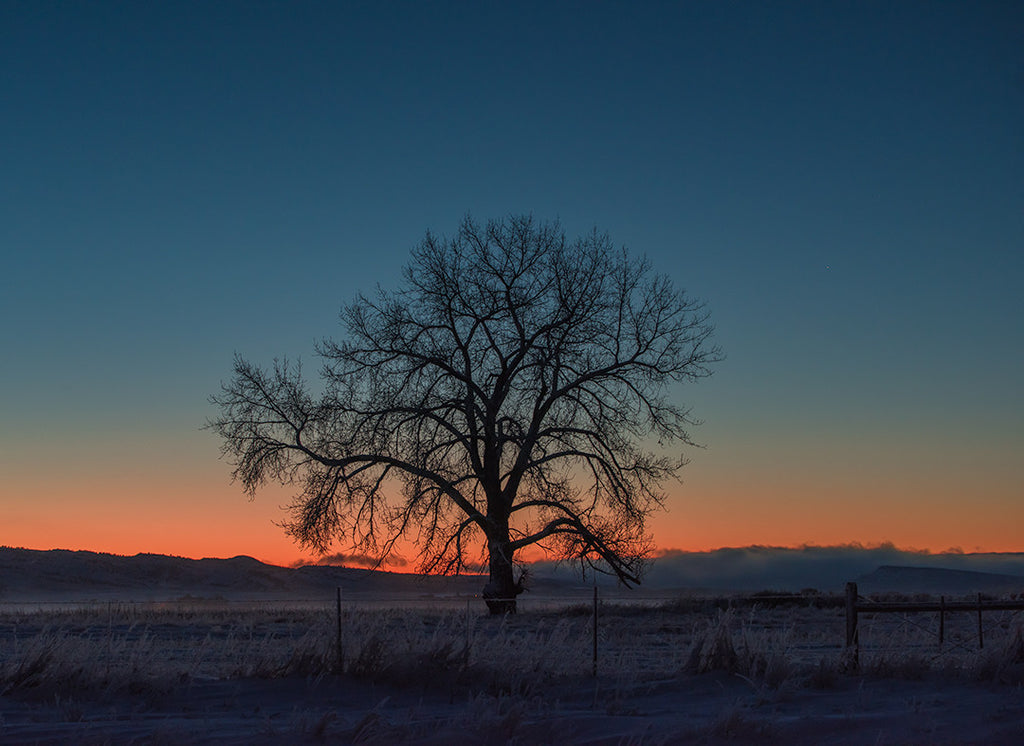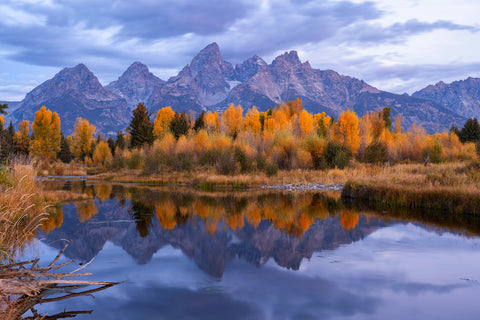I'm waiting on the edge of a frost-laden pasture for the naked cottonwood to appear in better definition against the dawn sky. It's a hulking tree with over one hundred and fifty years under its belt, sporting fissured bark and roots which guzzle 500 gallons of water a day during the summer. It's dormant now, a frozen sentinel that's stood guard over both pioneers on horseback and photographers with digital cameras and iPhones. I look at an app on mine, positioning the tree between me and where it predicts the sun to rise in about 45 minutes. Overhead, I can still see faint stars, pinholes in the silver sky, while somewhere behind me, stirred from sleep in their snowy cornfield, Canada geese begin honking. I stamp my feet and clap my gloved hands together, staring hard into the east as though I can will the sun to rise, and then I smile.
I thought about coming here for this shot a month ago. I've driven past this tree dozens of times in recent years, always admiring it, telling myself that sooner or later I've got to drag myself out of bed and see what she looks like at sunrise. Four weeks ago, during the longest nights and shortest days of the year, I simply couldn't muster the ambition. I wasn't entirely in the throes of seasonal depression, but like a bear who's fed well all fall and found the perfect spot to hibernate, my bed felt pretty damn good.
Yesterday, something changed. I was driving west on Montana's Interstate 90 in the late afternoon of a clear, winter day, subconsciously reaching up to flip down my sun visor, squinting against blinding snow, when it hit me - a month ago this would have been unnecessary. As I jerked my hand away, afraid that employing the visor might turn back time, a sweeping sense of accomplishment spread over me. A feeling of winning unknown to all who haven't lived in the North Country, where making it through the winter is no small feat.
"There you old bastard, how's that grab you?" I said out loud to a snow drift licking the top of a bulging fence designed to keep it from blowing over the highway. "You may not live forever after all!" A blast of north wind shuddered my truck in reply, and though my thermometer showed that I was cruising through air no warmer than 6 degrees I laughed. "The battle perhaps, but by god not the war," I said.
So here I am a day later, still riding the euphoric high brought about by celestial proof that Spring's infancy is upon us here in Montana. Listening to the geese increase their discussion - debating whether the morning's destination should be a patch of open water on the Clark's Fork of the Yellowstone or a stubble field of grain - I realize I'm no less thrilled by today's earlier-arriving dawn than I've ever been. I take a quick glance at my lens to be sure no frost is forming there, then let my mind rewind all the way to the first year I remember becoming aware of lengthening days.
It was on very nearly the same line of latitude I'm standing on now, almost exactly halfway between the Equator and North Pole, though more than 2000 miles east in Vermont's Northeast Kingdom. I was two years old, heading fast for three, looking out a living room window, surveying a Siberian-like landscape with what my father dubbed "a cold blue eye." The northern-most Green Mountains, a wavy line of distant peaks the color of shaded snow drifts, looked precisely as they had in November. Precisely as a boy who believed winter would never end imagined they would always appear.
And then, a shaft of sunlight. A ray of gold piercing the leaden cloud bank below with sufficient force to bathe the world in light more intense than I'd seen since the apple trees in our front yard held their leaves. I stood mesmerized, transfixed by what might as well have been an appearance by some wondrous god of rebirth. In an instant, I felt what every Vermonter has felt from the time its pine forests were home to Abnaki Indians - an overwhelming relief and innate recognition that the North's longest season isn't quite interminable.
Later, with tattered, brown snow pants dragging their cuffs under felt-lined boots, my father pitched a dappled-pink beach ball to me in our driveway, gentling it in underhand toward my cocked, plastic bat, allowing it to skate past him when I connected, bounding down the slope toward the highway, the year's first trickle of snow melt leaking in the same direction.
I blink back to the present where the wing beats of a hundred geese fill the air overhead, dark silhouettes pushing skyward. The flock swings north, their debated destination now settled upon, and I watch it V away until it's lost to a distant horizon hanging between night and day. It's time for my picture now, a shot of this tree with soft, pink light behind her, frost coating the barbwire fence between us, a sense of both chill and seasonal shift all around. My shutter clicks and it's done, a scene of transition preserved.
I'm cold now, but I don't want to leave just yet. I'll stick around and watch the sun boil up over the Pryor Mountains, its rays a bit stronger, its approach a bit farther north. I'll shiver and perhaps lose feeling in the tips of my ears, but I will embrace this day of more light, these precious moments when darkness ebbs a little sooner, the world is a little brighter and the universe more hopeful.




Andrea
❤️
Tanya Sousa
Perfect. :-)
Erin
Makes me feel hopeful too. ❤️